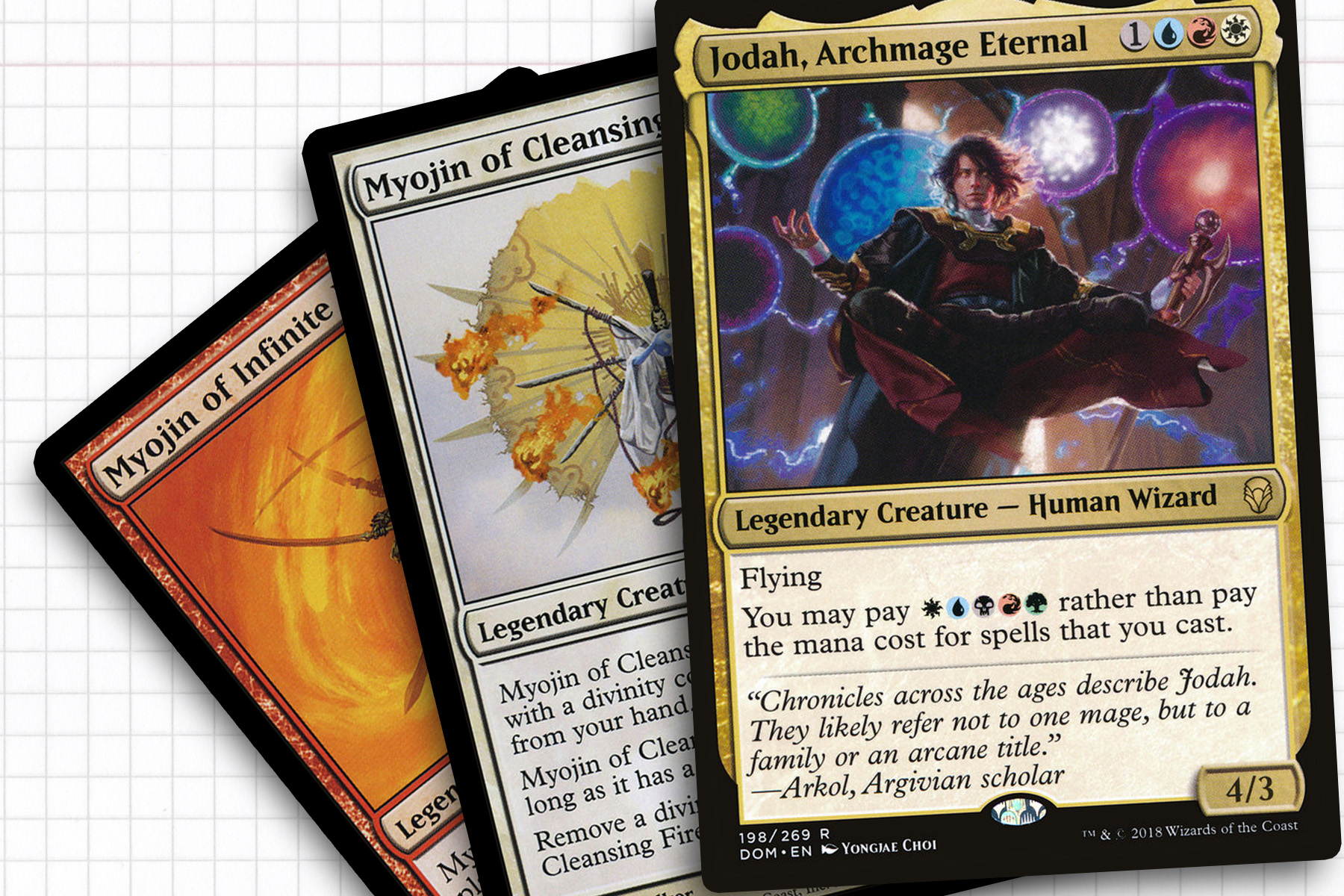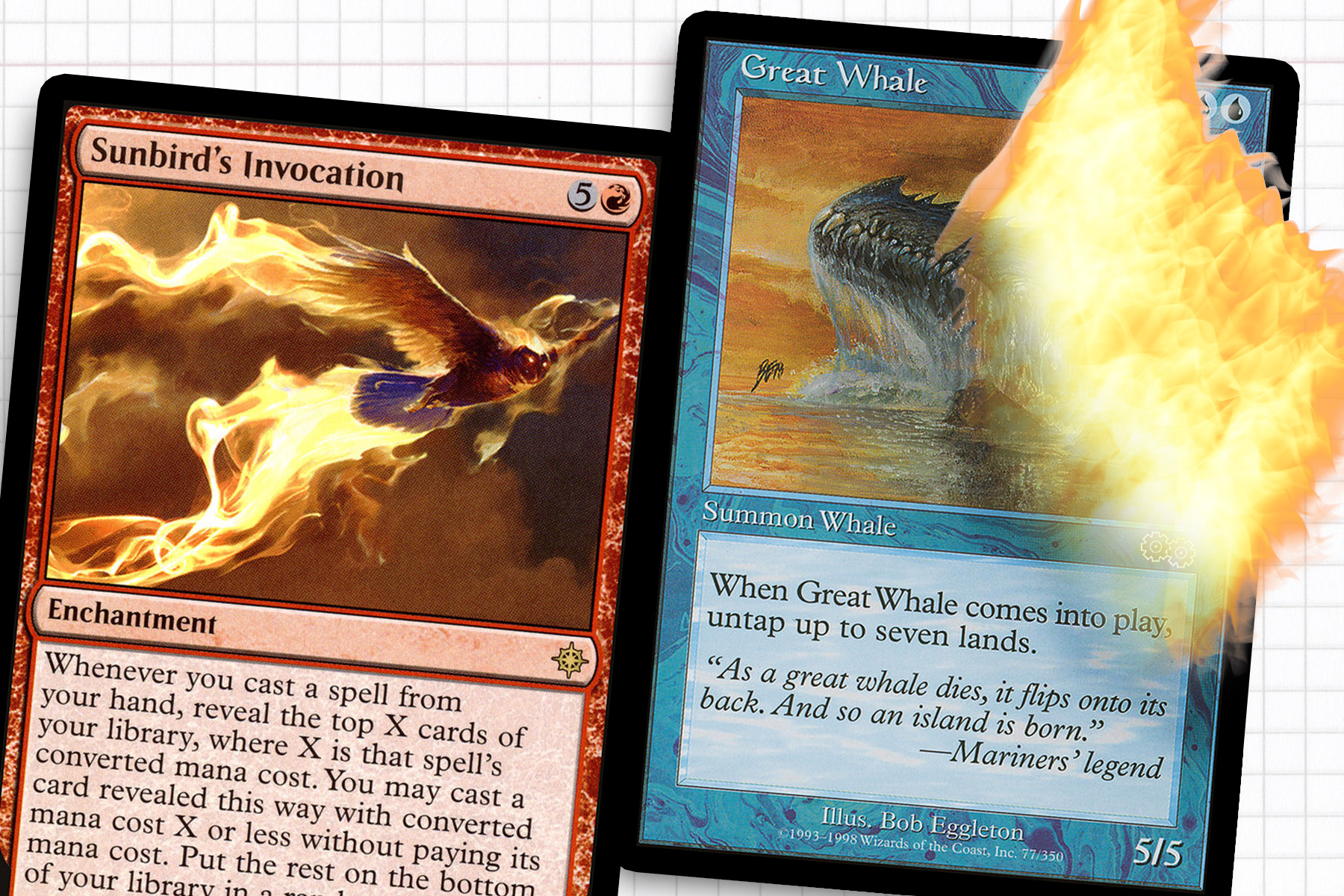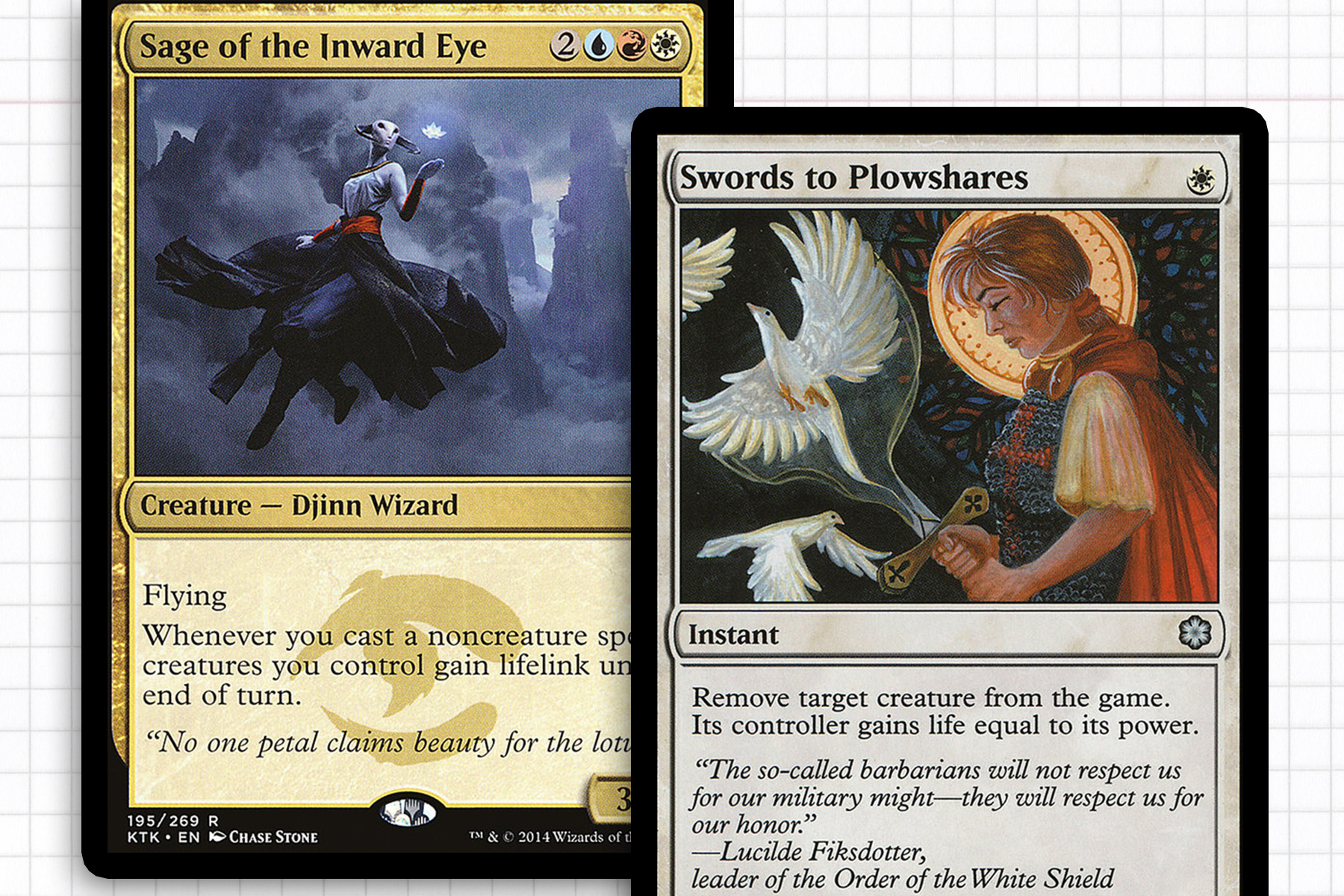For someone that writes so often about Commander, I have gotten to play a shockingly low amount of it as of late. I blame my trip back to college for breaking my habit. This means that a night of Commander generally means a lot more to me and leaves a more lasting impression.
At my last Commander night, this was an easily accomplished feat. I was playing with a few of my friends—Alex and Nate—and their buddy Cody, an on-and-off Magic player whose interests primarily sat in Legacy. Cody didn’t have a Commander deck on him—a problem I was glad to fix. As has been very well demonstrated, I have a lot of ideas for decks, and a decent number are physically built. One of my flaws as a deck designer is that I don’t always build towards “new user friendliness.” Luckily, I had what I believed would be a good showing for the night in the hands of another player: my Jodah, Archmage Eternal deck. This created an experience I don’t often get to see in real life: playing against my own decks and see how fun it is for other people.
I won’t pretend that my build of Jodah is optimal or even the best version it could be. But in handing it over, I believed it might be a perfect new player friendly deck for the metagame and the format. Most of what I wrote about the deck in the past is how the deck ended up being assembled; notable changes through the construction process were the suite of a dozen planeswalkers originally in the stack of cards in consideration that didn’t make it and the choice to chop out a few pieces of cycles in favor of trying to fit more unique effects into the deck to be more versatile to the format. For the most part the deck had the goal of being five-color binder chaff and thus far that theme has carried through. While these games will be the jumping-off point for the article, I do want to talk about the general idea of loaning out decks and how I believe this simple act can improve the way a Commander deck is built.

Five Color Chaff
I really believe that Jodah might be the best deck of mine to loan out. It doesn’t rely on any particular play patterns to traverse the game, and it is filled with spells that highlight parts of Magic you don’t often get to see, even in Commander anymore. This results in players old and new topdecking cards, marveling at them, and hopefully get excited by the possibilities. These moments happened several times during the two games we played, Cody would draw his card and as he read it over, I could see a sense of nostalgia in his eyes; and then he would laugh maniacally. With the ability to play over-costed cards at a much lower rate across all five colors, just about anything can happen. That made for a change of pace and frankly, plays I would not have seen or made.
Game one I was playing a Queen Marchesa Samurai deck and was stuck on four lands the whole game. Yet I enjoyed the experience, because I got to watch a deck that I thought was cool be validated by another player. This is of course built upon the fact that we were also playing with two of Alex’s decks, who I consider to be a better deck builder than me. So there were constantly two or three different angles that the game could have gone into. And occasionally we would shift into an impromptu archenemy game as Cody or Alex would be pressing an advantage, especially since Jodah can bounce back really well from a wrath.
Watching Cody cast Maelstrom Wanderer and cascade into a Etali, Primal Storm and Flying Crane Technique was just fun in an old-fashioned kitchen table Magic way. The game never really stopped moving, and while my attention was briefly resting on the torrent of spells next to me, Alex was setting up for a a big turn with his Okaun, Eye of Chaos / Zndrsplt, Eye of Wisdom coin flip deck. Watching Cody discover Sunbird’s Invocation and tying together the abilities of the several Myojin in the deck to deny us creatures and lands was infuriating, but also set the stakes really well. The entire game was a joy to watch.
The second game was less notable. I was playing Shattergang Brothers and trying to keep it together as a Mindleech Mass threatened to attack me while I had both Emrakul, the Promised End and It That Betrays in my hand. That left me with an overall feeling of worry; but since I was actually progressing my game, I paid less attention to Cody.

Knowing the Feeling
More players should loan out their decks, because it allows for you to see how your deck plays from a different perspective. I have designed custom magic cards before—especially enjoying the process of designing mechanics—and one of the big things I’ve had to learn is constantly looking at an individual card or mechanic and trying to figure out if it’s actually fun.
I now look at Commander decks the same way. Even if I’m having fun, is the rest of the table having fun? Commander is the format where players should be enjoying themselves. The games tend to be long and the interactions can become tedious. So it’s very important, I think, that you understand how your deck plays and how the interactions work when you’re not the pilot. Sometimes people will discover that entire mechanics mix and match better simply because they’re not the ones who built every win condition into a deck. Then, by extension, the deckbuilder may have new lines of play revealed to them that they never considered. Cody tied together Blessed Wind with Searing Wind back-to-back in one turn as he was staring down an alpha strike the next turn to greatly enhance his chances of winning—an interaction that was in the deck and I had never considered. It was very interesting to see what happens when you have a hundred cards randomly bouncing off each other in an uncontrolled environment.
Often in Commander, one of the biggest hurdles to get over when you’re coming in from more competitive formats is tuning your deck to outlast the longer games, while also trying to dial in on the fun. This can be subjective. Different groups will court varying levels of competition and fun in some ratio. Winnin the game is the goal of any deck I build, but it’s often less than 25% of the games I play where I win. (I swear, with just one more draw, I would have shown everyone how great I was.) I’ve gotten used to the ecosystem my decks exist in, reducing the overall amount of mass board wipes or counter magic, simply because I lean too heavily on someone else picking up the slack—often Alex Szeto. By seeing one of my own decks in the hands of another player, I begin to notice those shortcomings. I ought to play Solemn Simulacrum, Phyrexian Arena, and Day of Judgment more often, but so regularly I assume there are more stylish things I could doing. Rarely is that ever the case, but I didn’t see it until half the decks at the table have that handicap.

Piloting Other Decks
It’s also important to borrowing others’ decks. Obviously people don’t get deep into the format only to borrow a deck they don’t feel a connection with, but I think other player’s deckbuilding philosophies can open up people to archetypes, cards, or color combinations they don’t consider “fun.” A control player understanding how an aggro deck feels might make them reconsider being the “spell police” and countering every spells that gets cast. Playing tokens might give you the prospective to understand that their are signals when those decks are about to alpha strike, and that being the player who cast a Wrath of God every turn cycle can be really annoying and even might be a waste of your own resources. I was never really an aggro player in my Magic career until I trusted in the undying chaos of Ib Halfheart, Goblin Tactician and learned to not get so possessive of my hand, lands, or creatures. And on the flip side, learning the power of Remand or Swords to Plowshares and the tempo advantage gained from either can be an important step for some players.
Doing a deck swap will not solve all of your problems. It is not guaranteed to make you better at Magic or a more tolerant person, but I think it is part of Magic I have personally overlooked in the last few years. With the chance that I might be loaning a deck out for a night, it keeps me wanting to carry a more generally accepted deck with me more often. And that means building a few more to keep some variety for myself.
I want to borrow decks more often as well. I don’t have a well-tuned Planeswalker deck and I think I’d like to give a well-thought-out one a spin. I ought to borrow more of Alex’s decks, so that I understand how to better build with suites of effects in my deck. Maybe I explore an all-creature deck, or see what someone else does with a deck with only basic lands. What I’m trying to say is, Magic is an infinitely expansive game and we’d all be foolish to not see beyond our usual haunts.
Next week, I believe we’ll all be neck deep in Commander 2018 previews. I’m excited, and hopefully you are too!

